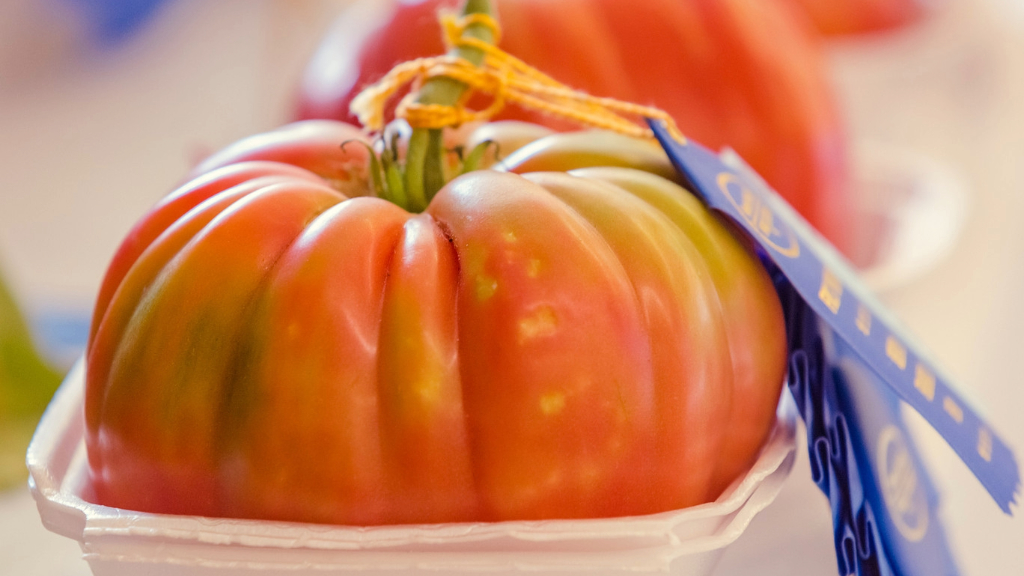How to Grow Blue Ribbon Tomatoes

Each year I keep a gardening diary - you know, one that lists the type of crop, planting date, performance, feeding, etc. This way I can either emulate my successes or improve my failures. I'm not exactly a master gardener, just a lady that likes to get her hands dirty, so I have my share of failures, especially with tomatoes. They tend to be spindly or prone to disease, and while I do get some tomatoes, it's not the bumper crop of monster fruit I'd like to get. I could blame my less than successful tomato crop on the weather (which I do), the fact that my better half forgot to water them (which I do), or any number of other factors. It can't possibly be anything that I'm doing! Or is it more like what I'm not doing? A search on the internet turned up a possible answer. Maybe I've been feeding them all wrong. It should be noted that I grow my tomatoes in containers because the only area that gets enough sun for them is on the patio. Given that they are container grown I know they need a little extra TLC, such as more consistent irrigation and regular feeding. I had been feeding the tomatoes with a regular garden variety NPK plant food, but it turns out that to get blue ribbon worthy tomatoes, they need more nutrients. That's when I found Great Big Plants and their organic soil and fertility products, in particular,  Great Big Tomatoes Natural Compost Extract. The testimonials alone from happy tomato growers was enough to pique my curiosity. For instance, Judy from Missouri says she "religiously used Great Big Tomatoes and from four tomato plants, harvested over 500 tomatoes." Wow, that's a lot of tomatoes! Another lady from Flagstaff, AZ was thrilled with her results after using this product. She commented on how her tomato plants went from "leggy and pitiful looking" to "tomato bushes" in only a week after having given them "½ cup of Great Big Tomatoes." [caption id="attachment_14977" align="aligncenter" width="400"]
Tomato plant before and two weeks after using the Great Big Tomatoes product.[/caption] Their parent company BioScientific has been in the business of supplying commercial growers with easy-to-apply alternatives to compost and manure. They developed a liquid compost formula that could be field applied through either regular or drip irrigation, with NPK input or without.
What makes Great Big Tomatoes Natural Compost Extract so special? To begin with, it includes the same beneficial microbes, humic and fulvic acids, kelp, and minor nutrients found in their all-purpose natural compost extract, as well as specially fermented biotic solution to boost the population of soil microbes and help repress disease.
The extract is designed to improve the soil right where it matters, at the roots. It boosts and replenishes the beneficial microorganism population, provides trace nutrients, and provides bioavailable carbon in the form of the humic acid to those microorganisms. Turns out that supplying my tomatoes with just NPK fertilizer isn't enough for big, luscious, bumper crops of tomatoes, which is exactly what I want. They need readily available essential micro-nutrients and trace minerals along with seaweed, humic acid and proprietary microbes. And, they are all-in-one easy to apply mixture; simply mix the extract at the rate of one ounce of concentrate per one quart of water and apply to the soil around your plants! I'm both budget conscious and an environmentally concerned gardener.
This extract is organically certified and is concentrated so one quart will make eight gallons of food, enough to feed 4 tomato plants for the season. It is biodegradable and never tested on animals. Plus, it's made in the United States. So if you want to create a stronger, healthier plant that is disease resistant with more blossoms and higher yields of big, succulent fruit (including plants that are 50% larger like those from Jim, a master gardener also in Flagstaff, who uses this product), why not give it a try. Easy to use, environmentally friendly and with a slew of believers in the power of this elixir, it's a no brainer"¦I'm in!
Sign up for the Gardening Know How newsletter today and receive a free copy of our e-book "How to Grow Delicious Tomatoes".

Amy Grant has been gardening for 30 years and writing for 15. A professional chef and caterer, Amy's area of expertise is culinary gardening.
